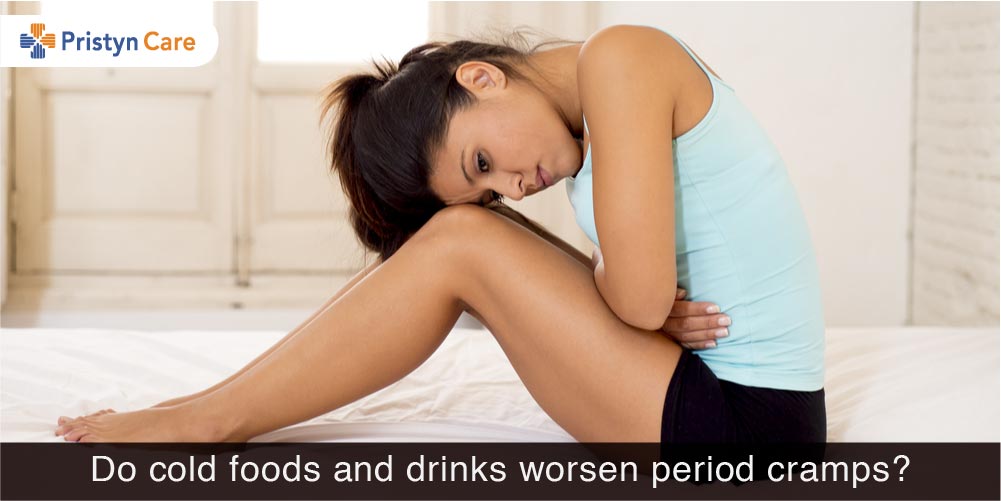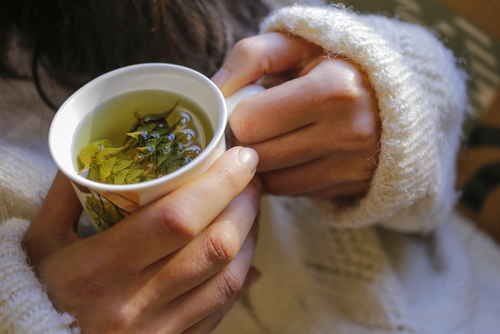
Most females suffer from fatigue, instability, mood swings and painful cramps during their periods. The food a female eats has a huge impact on her period cycle and cramps. Getting optimum nutrition, especially during the period cycle can counter cramps, muscle pain, mood swings, bloating, headache, and inconsistent digestion. Even though binge eating sounds more appealing, making the smart choice can ease out your period troubles.
Table of Contents
Do cold foods affect period cramps?

Who wouldn’t love a bowl of their favorite ice-cream along with their favorite show on Netflix to get relief from severe cramps and period pain? This may sound like a good plan but can actually worsen your period pains. It is advised to avoid eating or drinking cold foods and beverages during periods.
“Prostaglandins” are the reason that consuming cold foods and beverages like ice creams, cold water or soft drinks, etc. during periods makes the cramps worse. Prostaglandins are natural chemicals present in the body which are responsible for contractions in the uterus, in order to shed the endometrium (the inner lining of the uterus). This is how you get your periods.
Can you have dairy products during periods?

High levels of prostaglandins in the body are responsible for sharp menstrual pain and cramps. Dairy products such as ice-creams have arachidonic acid in them. This can cause a rise in the prostaglandin levels in the body, and worsen the cramps. If you suffer from severe cramps during periods, it’s better if you skip ice creams.
Even though it is suggested that dairy products should be avoided during periods, curd and buttermilk are the two dairy products which are recommended during periods. Carbonated drinks, caffeine, and aerated drinks should also be avoided during menstrual days because they have high levels of sugar in them, which can cause inflammation and make the cramps more severe. The best way to prevent period cramps due to foods is to analyze how your body reacts to different types of foods, especially cool foods and drinks in the menstrual days. You can then choose the foods which soothe your body and do not elevate cramps, pain or discomfort.
Foods to avoid during periods

- Alcohol
- Caffeinated drinks
- Processed foods (Also Read: How Dangerous are Processed Foods? )
- Foods high in fats
- Dairy products
- Fried foods
- Refined grains
- Foods with a high salt content
Foods to eat during periods

- Chocolate
- Bananas
- Salmon
- Yogurt
- Whole grains
- Watermelon
5 Effective Tips to Prevent Period Cramps
-
Increase Calcium and Magnesium intake

Increase the intake of calcium and magnesium in your diet. Deficiencies of these 2 nutrients can be responsible for period cramps. Consult your gynecologist about taking calcium and magnesium supplements throughout the month. These nutrients work by aiding muscle relaxation.
-
Herbal Tea

Raspberry leaf is a well known mild uterine tonic. Drink a cup of raspberry leaf tea every day, all through the month. It is easily available in the market and online retail stores. Just make sure to choose the herbal tea, not the raspberry-flavored black tea, for the best effects.
-
Eat More Green Vegetables

Dark leafy green vegetables are a rich dietary source of magnesium, calcium, and many other micronutrients. These nutrients help in mediating contractions in the muscles. Dark green vegetables are widely used in Chinese dietary therapy for mild cleansing, which is good for the body during the stagnation condition. Some green vegetables like dandelion greens, which are actually very bitter in taste, but are very helpful in reducing period cramps. Dandelions also have a mild diuretic effect, which can reduce bloating.
-
Reduce the intake of Coffee

Coffee is a well-known vasoconstrictor, which can make the blood vessels constrict. Caffeine intake can even tighten the vessels that feed the uterus, causing more cramps during periods. Reducing your coffee intake and cutting down completely during periods can help reduce period cramps.
-
Use a Heating Pad

Placing a heating pad or hot water bottle on your abdomen or the areas of pain or cramps can reduce muscle spasms and thus give relief from period cramps.
If you still do not get relief after trying home remedies or changing your eating habits during periods, it is suggested to speak to a gynaecologist to rule out the risk of serious menstrual or other health problems.
Also Read:






